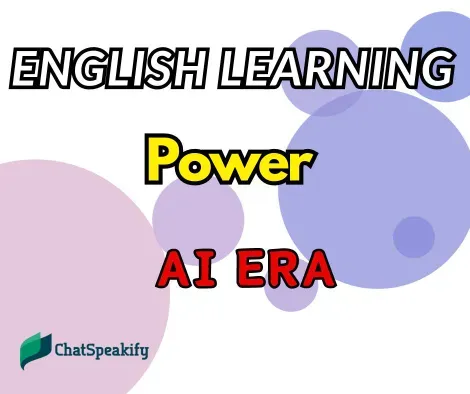The start of the AI era has transformed several industries, including language learning. Picture this: You’re trying to learn English, and instead of struggling through textbooks or repetitive grammar exercises, you’re engaged in a lively conversation with an AI that corrects your mistakes in real time, suggests better phrases, and even shares cultural nuances. It’s as if you’ve hired an ever-patient personal tutor, available 24/7, tailored to your pace and needs.
The Shift to Personalized Learning
One significant change AI brings to English learning is personalized education. Traditional classrooms frequently confront the problem of meeting various student requirements using a one-size-fits-all approach. However, AI can measure learners’ competency, learning style, and preferences to provide tailored information. For instance, platforms like ChatSpeakify, Duolingo, and Rosetta Stone have integrated AI to adapt lessons in real-time based on user performance. This tailored approach guarantees that learners are not bored with too primary assignments or overwhelmed by complexity.
Real-Life Example:
Consider Maria, a native Spanish speaker who wants to learn English. She often struggled with verb tenses, mixing up ‘has’ and ‘had’ in conversations. With AI-powered learning tools, her lessons focused more on her weak areas. Interactive exercises presented in her daily app usage specifically addressed her common mistakes, and even the app’s feedback was in Spanish, making it easier for her to understand and improve.
Immersive Learning Experiences
AI has also enabled the creation of fully immersive learning environments. Virtual Reality (VR) and Augmented Reality (AR), powered by AI, enable learners to practice English in simulated real-world scenarios. Imagine wearing a VR headset and finding oneself in an English-speaking nation, navigating daily life, or interacting at a virtual café. These immersion sessions are essential for developing confidence and practical language abilities.
Data and Research:
A study published in the Journal of Educational Technology & Society highlighted that students using VR for language learning showed a 30% improvement in speaking and comprehension skills compared to traditional methods. With the risk-free environment that AI-powered tools offer, students may practice without worrying about making errors in front of others.
AI as a Language Model
Natural Language Processing (NLP), a subset of AI, has achieved significant strides with models like OpenAI’s GPT-3. These language models can provide instant feedback on grammar, vocabulary, and pronunciation. They can also generate contextual conversations, making them highly effective for language practice.
Authoritative Source:
According to an article from the Massachusetts Institute of Technology (MIT), AI language models not only help in correcting grammatical errors but also enhance vocabulary acquisition by providing contextually relevant word choices. This continuous interaction with AI improves fluency and broadens one’s linguistic range.
Breaking Down Barriers
One of the most profound impacts of AI in English learning is its ability to break down barriers. Whether it’s geographical, economic, or even emotional barriers, AI-powered tools democratize access to high-quality language education. For instance, AI can instantaneously translate articles, videos, and other learning materials into multiple languages, making resources available to a global audience.
Personal Experience:
Reflect on a scenario where a refugee child in Jordan learns English to integrate better into their new environment. AI-enabled educational tools equipped with translation and adaptive learning features offer them a lifeline to education, enhancing their language skills despite the lack of traditional resources.
Humor in Learning
AI’s potential doesn’t stop at serious learning; it can also incorporate elements of humor to make the learning process enjoyable. Interactive chatbots often use humor to engage users and make lessons more relatable and fun. This can be particularly effective in retaining learners’ interest and reducing the intimidation that often comes with language learning.
Example:
Imagine an AI tutor making a playful joke when you mix up ‘dessert’ and ‘desert’, helping you remember, through humor, that one is sweet and the other is sandy.
Conclusion
The AI age has undeniably accelerated English learning, making it a more customized, engaging, and approachable experience. Embrace these innovations, and you’ll find that learning English—or any language—becomes not only more effective but also a journey filled with unexpected delights and continuous discoveries. Like Maria or the refugee child, there’s a whole world of opportunities to unlock once the language barrier is lifted, and with AI, that goal is more attainable than ever.
References
“ChatSpeakify and the Future of Language Learning.” TechCrunch.
So grab your virtual tutor, put on that VR headset, or simply download an AI-powered app, and start your English learning adventure today!
